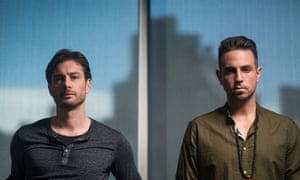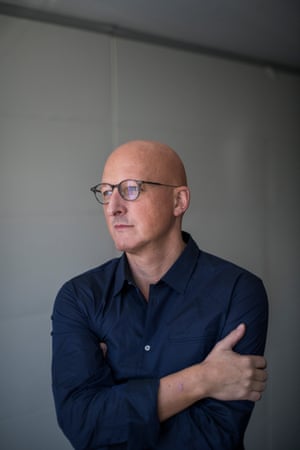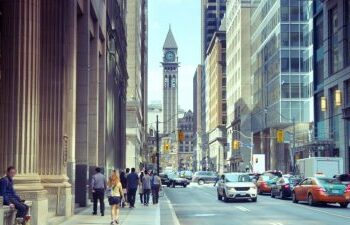Wade Robson and James Safechuck speak about their childhood experiences with the pop superstar – and Dan Reed explains why he felt he had to expose their allegations in his film Leaving Neverland
“Michael Jackson was one of the kindest, most loving people I knew. He helped me tremendously with my career and my creativity,” Wade Robson says. “He also sexually abused me for seven years.”
I am talking to Robson, 36, and James Safechuck, 41, the subjects of Dan Reed’s definitive documentary Leaving Neverland, in which they describe, in heartbreaking detail, how Jackson sexually abused them for years, from their childhood to teenage years. Even though Safechuck and I are both in Los Angeles, it was decided that instead of meeting in person, it would be better for me to speak to him on a multiway call with Robson, from his home in Maui. The more we talk, the more obvious it becomes how much comfort the two men find in talking together and listening to each other, in particular the slightly more fragile Safechuck.
It is impossible to pick out the most devastating moment from the four-hour documentary: Safechuck describing the mock wedding Jackson staged for them when he was about 11, including an exchange of vows and giving him a ring? (Safechuck’s hand shakes violently as he shows the ring to the camera.) Robson recalling how it felt to be forced to give oral sex to a grown man when he was seven years old? Hearing how Jackson literally bought off their parents with first-class plane tickets, fancy hotels and, in Safechuck’s case, a family home? Really, take your pick.
“I find it hard to be angry at other people. I’d almost be excited to be angry at anyone else because that would feel healthy. But I still feel like it was my fault,” says Safechuck.
Robson met Jackson when he was five, after winning a dance competition in Australia. His prize, to the sensitive, Thriller-obsessed little boy’s delight, was to meet Jackson himself, then on the Bad tour. Footage from the concert shows Jackson – surrounded by other children on stage, a rock’n’roll Pied Piper – singling out Robson to dance for the audience, which he does with astonishing precocity. In TV interviews from the time, Robson describes his excitement at meeting Jackson – he was so young his enunciation of the singer’s name was still babyish (“Mi-ko Ja-son”).
Two years later, Robson and his family went to California and his mother made contact with Jackson, who invited the Robsons to Neverland. Robson and his sister slept with Jackson in his bedroom while the adults slept in the guest house. In the documentary, Robson says, yes, it was strange that he and his sister were sharing a bedroom with a man they barely knew, “but it felt like I’d known him for years. His posters were in my living room, his music in my ears. I’d known him, I thought.” When his parents announced it was time to leave, Jackson convinced them to leave their son with him, on his own. They agreed, and the abuse started as soon as his parents left Neverland’s driveway. In a queasy echo of Jackson’s 1982 ballad Human Nature (“If they say why, why, tell them that it’s human nature / Why, why does he do me that way?”), Jackson assured the seven year old: “This is how to show love,” but said he should never tell anyone. This would continue for seven years.
Michael Jackson with the Robsons in 1990. Photograph: Wade Robson Archive/AMOS Pictures
“He made me feel complicit, that I wanted it at least as much, if not more than him. And the thing is, the abuse didn’t feel strange because it was being done by this man that was like a god to me. So much of it was validation for me. But what does that mean, that I liked it? Like, I’m a freak too,” Robson says, his voice cracking.
Safechuck met Jackson when he was 10 – a happy, outgoing boy who was picked to appear with the singer in a Pepsi commercial. Jackson invited him along on the Bad tour with him, and they were soon sharing a hotel room while his parents slept down the hall. “For him to want to be our friend, we’re like, oh my God, how lucky are we? He flies you first class, he has a limo waiting at the airport, amazing! It’s a life of the rich and famous,” Safechuck’s mother, Stephanie, recalls in the film. Meanwhile, Jackson was sexually abusing Safechuck and telling him that if anyone found out they would both go to jail.
Enough is enough: Michael Jackson’s music is dead to me now
Suzanne Moore
Reed is an acclaimed director of documentaries, largely focusing on terrorism, but he decided to make Leaving Neverland because: “Michael Jackson felt like one of the big unresolved stories out there,” he says when we meet in London. “It felt like Jackson, the abuser, was something people knew, but didn’t really know.”
Yet the unavoidable question that recurs throughout the film is, why on earth didn’t we? Jackson was publicly accused twice of child sexual abuse – first in 1993 by Jordy Chandler, then again by child cancer survivor Gavin Arvizo in 2003. In neither case was Jackson convicted – he settled with the Chandlers and he was acquitted in the Arvizo case – but it’s not as if the clues weren’t there. As the film makes clear, Jackson was even more blatant about what he was doing than Jimmy Savile, rarely photographed without holding a little boy’s hand, openly admitting he slept with boys in his bed. While watching the movie I realised with a jolt that even my favourite Jackson video, Smooth Criminal, features little children as, in fact, do many of Jackson’s videos, and he used this as bait.
Robson was devastated when he found out that Jackson had broken his promise that he would appear with him in the video for Black or White, giving the part instead to Macaulay Culkin. “I realised every 12 months there was a new boy in [Jackson’s] life,” Robson’s mother, Joy, says. At Neverland, Reed points out, “nearly every room had a bedroom attached” and Jackson’s maid, Adrian McManus, said last month that there was Vaseline and children’s underwear “all over the house”. The man who so often sang about being the helpless victim of sexually predatory women (Billie Jean, Dirty Diana) was astonishingly flagrant in suggesting his own predatoriness.
Dan Reed. Photograph: Joshua Bright/The Guardian
“When I set out to make the film, Savile was quite recent, and the more I looked into it I thought, ‘This really could be America’s Savile moment,’” Reed says. And, as with Savile, the public is left wondering how on earth this was allowed to happen.
Leaving Neverland does a lot to answer that question, particularly through the interviews with Robson and Safechuck’s mothers. Both freely admit they were dazzled by Jackson’s celebrity and money. More specific to Jackson’s story is how he, effectively, groomed people with his bizarre public image: oh no, this man – who surrounds himself with children and built himself a children’s amusement park in the middle of nowhere – isn’t an abuser. He’s just a simple childlike weirdo! Jackson knew on some level that what he was doing was wrong – otherwise he wouldn’t have coached the boys to keep quiet about it. And yet he repeatedly sang about how unfair it was that he was so misunderstood and persecuted in songs such as Scream, Leave Me Alone and Why You Wanna Trip on Me. When Stephanie Safechuck initially expressed reservations about letting her son go into Jackson’s trailer on his own when they were shooting the Pepsi commercial, Jackson’s hairstylist reassured her: “It’s OK, he’s like a nine-year-old boy.”
When I ask if they are angry at their parents for leaving them so unprotected as children, Robson says: “I’ve definitely gone through multiple stages of anger at my parents and maybe it’s done now, but I really can’t say.” Safechuck says simply: “I’m working on it.”
Jackson abused Robson and Safechuck hundreds of times, and watching the film it is impossible to believe they were the only victims. Robson, for instance, went to sleepovers at Neverland where Jordy Chandler and Macaulay Culkin were also present. Safechuck was heartbroken when he found out Jackson chose to take Brett Barnes on the Dangerous tour instead of him. Barnes later said he shared Jackson’s bed for nine years, but both he and Culkin deny Jackson ever abused them.
Watch the trailer for Leaving Neverland: Michael Jackson and Me – video
“I definitely think there are more kids. But it’s such a traumatic experience some people may never deal with it,” says Safechuck. “I didn’t see any abuse in front of me, but I saw hugging, kissing and Jackson disappearing with other children [at Neverland], things that happened with me,” says Robson.
How big a part might shame play in other victims’ reluctance to acknowledge what happened to them? “I don’t want to take anything away from the pain of girls who are sexually abused, but I do think [sexual abuse of boys] is maybe harder for society to acknowledge. And maybe for the victims it’s harder to admit because there are all these ideas that you’re not masculine because of what happened to you,” says Safechuck.
“The stories many of us are taught – what it means to be a man, to be strong at all times, not crying – it definitely made it more difficult for me to question what happened between Michael and me,” agrees Robson.
Did Jackson ever tell them that he himself had been abused? “He never spoke of any sexual abuse, but he spoke of physical and emotional abuse from his father, and how terrified he was of his father, even as an adult,” says Robson.
For years, Robson and Safechuck denied they had been abused. While Jackson was alive, and allegedly at his urging, they both testified under oath that he had never touched them. As adults, they attempted to forge independent lives: getting married, getting jobs. Safechuck worked in tech, Robson became a choreographer to, among others, Britney Spears and ‘NSync. But cracks were starting to show – depression, anxiety. Robson even stopped dancing for a few years because he associated it with Jackson. The catalyst for both men finally telling the truth to their therapists and families was when they had children and understood how vulnerable they had been. When the film premiered at the Sundance festival, the two men talked and realised they had shared identical anxieties about their boys reaching the ages they were when the abuse started, and seeing how young they had been.
“But when my boy turned seven there was this actual incredible feeling of love and a relief, knowing he was so much safer than I ever was,” says Robson.
The Jackson family, his estate and the superfans (Reed calls them “the cultists”) have all reacted true to form to Leaving Neverland, vilifying Safechuck and, in particular, Robson. That Robson testified in Jackson’s defence has been used against him, even though other witnesses at the 2005 trial testified they had seen Jackson molest him. Even more ironically, that Robson sued Jackson for sex abuse in 2013 is seen as further evidence by the Jackson defenders that this is just about money. (One judge ruled in 2015 that Robson’s claim was too late; another in 2017 that the Jackson corporations were not liable for Jackson’s activities. Neither commented on the credibility of the allegations.)
James Safechuck’s photograph of Michael Jackson at Disneyland in 1988. Photograph: James Safechuck Archive/AMOS Pictures
“For Wade, the court case was about getting his story out there and I think he also felt: ‘Here is an organisation, the Michael Jackson Estate, for which Jackson made a huge amount of money and all the people involved in this business looked the other way while I was being raped, and that’s not right,’” says Reed. “But the Jackson camp’s response to the film has come out of their 1993 playbook: attack the victim. And I don’t think that’s going to play well in 2019.” Judging from the largely positive reaction to the film so far, he’s right.
“I was trying to prepare for a negative backlash, so it’s been a surprise that so many people are supportive, but that in itself has been hard to take in,” says Safechuck. “There was a big crash post-Sundance, so I’ve been trying to find a healthy way to process it. I don’t want to go high and then have these depressive lows.”
Since the revelations from the film have started to leak into the press, a lot of the conversation has been what to do about Jackson’s music: should it be shunned, like Gary Glitter’s? Or is he just too huge to banish? For Robson and Safechuck, the issue is both more personal and bigger than that.
“I don’t care what people do in relation to Michael Jackson and his music,” says Robson. “What I’m interested in is continuing the conversation of who are we worshipping and why, and making people look at the whole story. Michael Jackson was incredibly talented, there’s no questioning that. But just because someone is talented doesn’t mean they’re not a predator.”




















